St. Patrick's, philosophy and laughter
Another St. Patrick's day, as an Irish barman at "Paddy's Bar" said: "It's an excuse to continue the Carnaval" - doubtless St. P's was another imposition of Christian dominance over older pagan festivals. St. P's day is on the supposed date of his death - seems a good reason to celebrate. I drink in sympathy with the poor bloody Irish who suffered not only British rule, but centuries of Christian misery.
But the people who imposed it were often far from being saints:
Much of the Declaration concerns charges made against Patrick by his fellow Christians at a trial. What these charges were, he does not say explicitly, but he writes that he returned the gifts which wealthy women gave him, did not accept payment for baptisms, nor for ordaining priests, and indeed paid for many gifts to kings and judges, and paid for the sons of chiefs to accompany him. It is concluded, therefore, that he was accused of some sort of financial impropriety, and perhaps of having obtained his bishopric in Ireland with personal gain in mind.
http://en.wikipedia.org/wiki/Saint_Patrick
What a surprise.
The musicians at Ma Nolan's.
It was pleasant to stand at the door and listen to the music - apart from the smoker indulging his habit - one could see Nietzsche's terrace above Cours Saleya:
I walked along the Cours enjoying the lovely evening light:
Passing by an arch through which one could see the Med:
At the end, another example of the sick Christian symbol:
- reminding me of Bill Hicks: "If he came back, do you really think he'd want to be reminded of that?" But the blue sky seemed more in keeping with Nietzsche's life-affirming attitude; I imagine him looking down with scorn from his terrace:
What is un-Greek in Christianity. The Greeks did not see the Homeric gods above them as masters and themselves below them as servants, as did the Jews. They saw, as it were, only the reflection of the most successful specimens of their own caste, that is, an ideal, not a contrast to their own nature.
...
All psychological invention of Christianity work toward this sick excess of feeling, toward the deep corruption of head and heart necessary for it. Christianity wants to destroy, shatter, stun, intoxicate: there is only one thing it does not want: moderation, and for this reason, it is in its deepest meaning barbaric, Asiatic, ignoble, un-Greek.
http://nietzsche.holtof.com/Nietzsche_human_all_too_human/sect3_Religious_Life.htm
Nietzsche was to pop up again this evening.
Paddy's Bar is in Rue Droite, at the end of Cours Saleya, and of course it was only fitting to have a drink there too. I said that their house red was good, the young Irish barman replied: "That"s what comes of having a French owner of an Irish pub". Ah, the benefits of European integration - Irish ambience with French gout.
The philosophy of laughter
In keeping with this Euro spirit I was going to take a break to try that very French institution, a cafe-philo, this one at Sezamo, where I'd gone for their Rock/Blues night. But in keeping with the festive spirit the subject was - laughter ! Of course the idea that this is a philosophical topic would cause considerable mirth amongst some British philosophers.
I had imagined that, despite my experience with the late start of the Rock/Blues night, they would start a cafe-philo roughly on time. Of course I was first at 8 pm and the barman told me it probably wouldn't get going till 9 pm - again ! He smiled when I said I'd heard of the "quart d'heure francais" - but une heure was ridiculous. Fortunately people started drifting in, mainly women - perhaps there was some important football match on TV - and we got going as early as 8.30.
But the animateur was a guy, Bruno, and the manager of the place joined him (though Bruno jokingly tried to shut him up a couple of times - unsuccessfully, he was Italian) and another guy in the audience did a lot of talking. Pretty standard behaviour in mixed groups. Of course MY interventions were valuable contributions :-) and were sadly limited by my still inadequate French (which also meant that the jokes in French generally sailed over my head).
Bruno began by giving some academic credibility to the topic by referring to Bergson's text on laughter:
"What does laughter mean?" Henri Bergson begins his work on Laughter with this simple and general question. His intention is to analyze the things that make us laugh in order to find out how it is that they make us laugh.
Almost immediately Bergson limits his scope with three observations about comedy and laughter:
1. Comedy is necessarily human: we laugh at people or the things they do
2. Laughter is purely cerebral: being able to laugh seems to require a detached attitude, an emotional distance to the object of laughter
3. Laughter has a social function
These observations are perhaps controversial, but they help us understand at least what kind of laughter and what kind of comedy Bergson is talking about.
It was quite a Nietzschean night:
Nietzsche distinguishes two different purposes for the use of laughter. In a positive sense, "man uses the comical as a therapy against the restraining jacket of logic morality and reason. He needs from time to time a harmless demotion from reason and hardship and in this sense laughter has a positive character for Nietzsche."[11] Laughter can, however, also have a negative connotation when it is used for the expression of social conflict. This is expressed, for instance, in The Gay Science: "Laughter - Laugther means to be schadenfroh, but with clear conscience."
I referred to Arthur Koestler's "Act of Creation":
"The Act of Creation" offers a theory to account for the "Ah Ha" reaction of scientific discovery, the "Ha Ha" reaction to jokes and the "Ah" reaction of mystical or religious insight. In each case the result is produced by a "bisociation of matrices" or the intersection of lines of thought which brings together hitherto unconnected ideas and fuses them into a creative synthesis. When the lines of thought are scientic the result is a scientific discovery, when they are concerned with devotional matters the result is mystical insight and when they are on a more homely plane the result can be a joke.
http://www.amazon.ca/Act-Creation-Arthur-Koestler/dp/0140191917
The talkative guy (not me !) rather arrogantly dismissed the idea of laughter as therapy and was rebuked by a woman who cited the evidence for the beneficial effects of laughter.
I don't suppose I endeared myself to the females by referring to one of Koestler's examples of how jokes involve bisociation: Woman: "Sir, you will never win my heart." Man: "Madam, I never aimed so high." Later the Italian made some critical remarks about the British (entirely deserved) and I (having had a few drinks by now) recounted (in very bad French and almost forgetting a key line) Churchill's reply to a woman who said that he was drunk: "Yes madam, and you are ugly, but in the morning I will be sober."
When Bruno told an anti-female joke - "It's not MY joke and I'm just illustrating a point ... " - a woman told a joke which I think I got; it involved a lonely neuron in a dark male skull - which was asked why it didn't join all the others "down below".
The session drew to a close - just before the battle of the sexes broke out - and it was still St. Patrick's day. Sezamo is near the port and there is a big Irish pub there. However it was packed and one could obviously wait a long time to buy a drink. I went round the port, the hill with Nietzsche's terrace is nicely illuminated:
I headed up rue Cassini (the Nicois astronomer), back into the old town and to O'Hara's (also in rue Droite), where it was not only St. P's, but also the last night of the people who'd run it for some years.
There was just about enough room to squeeze by in the narrow first part of the pub:
I asked the landlady if the music had finished, and discovered that there was also a downstairs bar which I hadn't known about. But then it was mainly used for serving food and eating in a pub is not one of my habits. I expected a cellar bar with music to be packed on St. P's day, but there were even seats to spare. So I got another Irish music fix and a drink in comfort.
An Irish toast (quite philosophical):
"It is better to spend money like there's no tomorrow
than to spend tonight like there's no money!"
Bringing my dual-themed evening together in a kind of Koestlerian bisociation:
A good laugh always helps, and more so when it is celebration time. On the eve of St. Patrick's Day, enjoy-n-forward these Irish jokes, for jokes are for sharing.
...
An aging man lived alone in Ireland. His only son was in Long Kesh Prison, and he didn't know anyone who would spade up his potato garden. The old man wrote to his son about it, and received this reply, "For HEAVENS SAKE, don't dig up that garden, that's where I buried the GUNS!!!!!"
At 4 A.M. the next morning, a dozen British soldiers showed up and dug up the entire garden, but didn't find any guns. Confused, the man wrote to his son telling him what happened and asking him what to do next.
His son's reply was: "Just plant your potatoes."

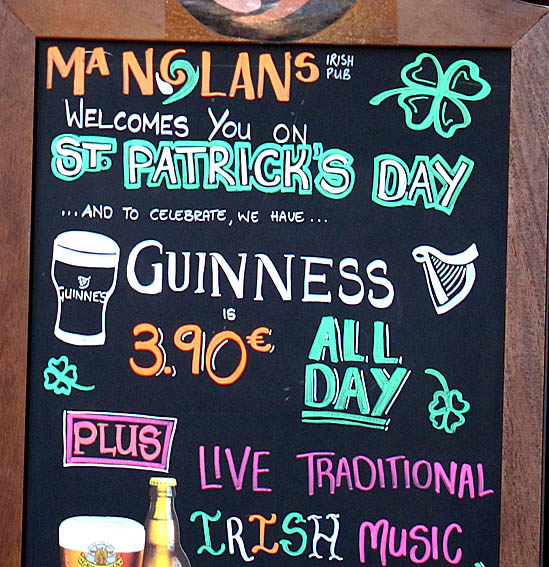

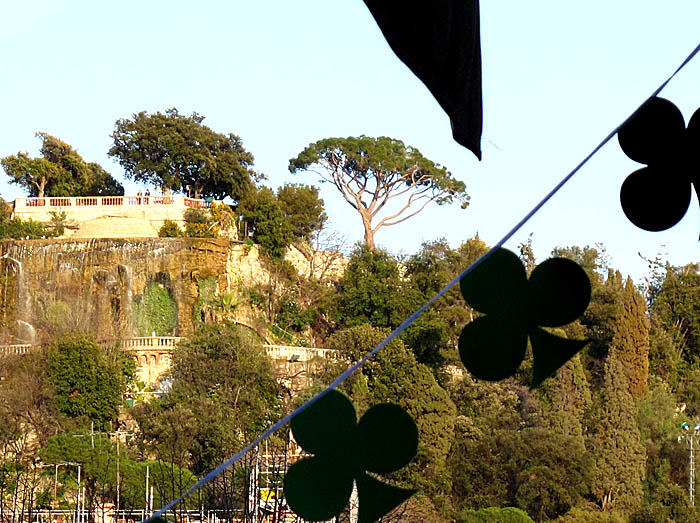

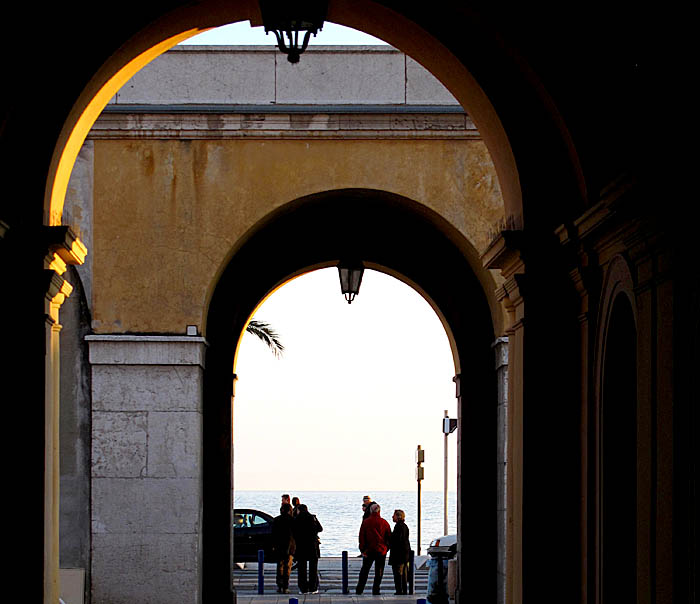
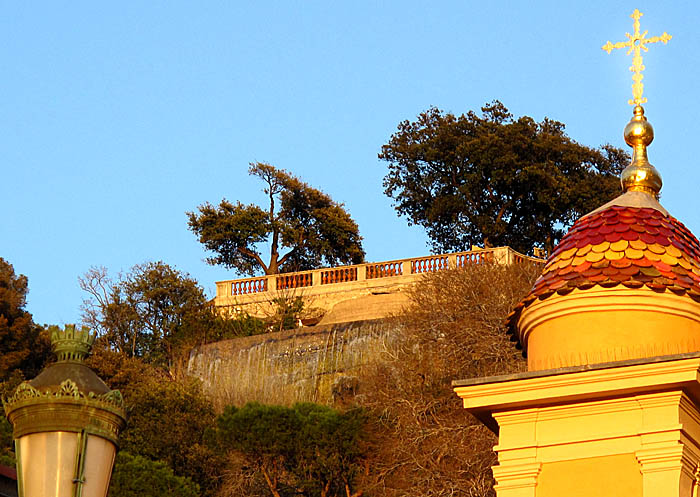



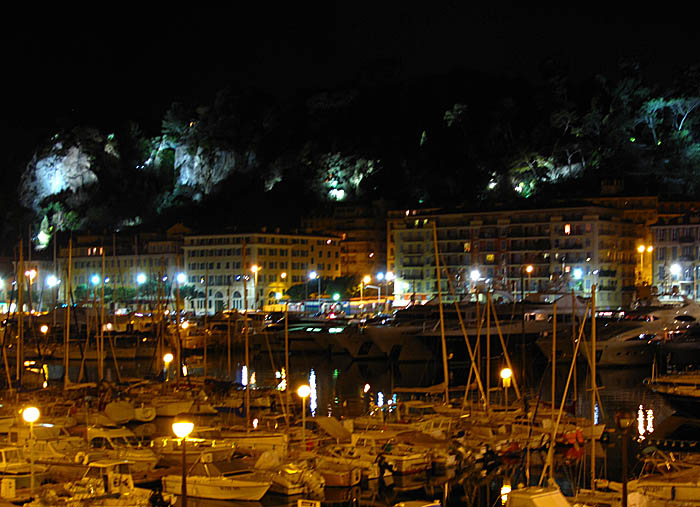
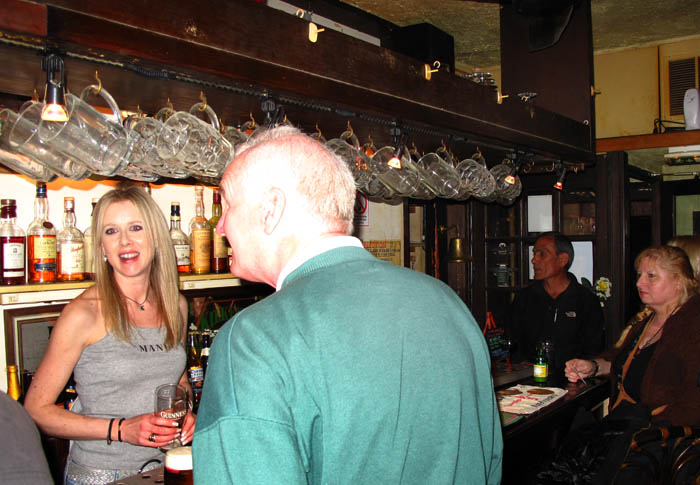

No comments:
Post a Comment